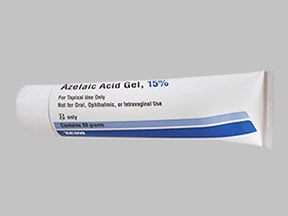My prescription
Edit
50GM of 15%, Azelaic Acid (1 Tube)
Select pharmacy

CVS
$26.29
COUPON PRICE
Walgreens
$35.95
COUPON PRICE
Walmart
$39.58
COUPON PRICE
Albertsons
$47.41
COUPON PRICEAzelaic Acid savings card
Show this card to your pharmacist
CVS
$26.29
BIN
ID
PCN
GRP
019876
LH7B1ED3F7
CHIPPO
LHX
Powered by
More prescriptions for rosacea
More prescriptions for rosacea
Price history for Finacea (brand) & Azelaic Acid (generic)
1 Tube, 50GM of 15%
Average retail price for Finacea
Average retail price for Azelaic Acid
Average SaveHealth price for Azelaic Acid
Our price history data is based on aggregated prescription data collected from participating pharmacies in America. Our prescription data updates daily to reflect the latest price changes. If you notice a missing data point, it means there wasn't sufficient data available to generate a monetary value for that date.
We analyzed Azelaic Acid prices for (50GM of 15%, 1 Tube) over the last 12 months. The average retail price was $115.38, while the average price using the SaveHealth discount card was $72.44. That's a savings of approximately 37.22% when using our Azelaic Acid coupon.
Compared to the generic version, Finacea had an average price of $571.14 over the same time period. With the SaveHealth savings card, Azelaic Acid is 87.32% cheaper on average than Finacea.
*Retail prices are based on pharmacy claims data, and may not be accurate when we don't have enough claims.
Azelaic Acid dosage forms
Dosage Quantity Price from Per unit 50GM of 15% 1 Tube $26.29 $26.29 50GM of 15% 2 Tubes $34.28 $17.14 50GM of 15% 3 Tubes $50.27 $16.76
| Dosage | Quantity | Price from | Per unit |
|---|---|---|---|
| 50GM of 15% | 1 Tube | $26.29 | $26.29 |
| 50GM of 15% | 2 Tubes | $34.28 | $17.14 |
| 50GM of 15% | 3 Tubes | $50.27 | $16.76 |

